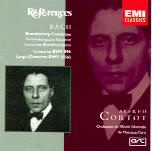It’s odd that EMI chose Alfred Cortot’s truly bizarre early-1930s Brandenburg Concertos over the Busch Chamber Ensemble’s acclaimed, contemporaenous versions for inclusion in its recent Bach reissue survey. While Cortot’s lavish rubatos in Chopin and Schumann make your spine tingle, his similar gestures in Bach might cause your stomach to cringe. Virtually every cadential signpost is delineated by a humongous ritard, to particularly loopy effect in the Second Brandenburg. Yet tempos are rapid to the point of recklessness, save for the heavy tread of the Third Concerto’s opening movement. The Ecole Normale Orchestra plays with utter joy and infectious zest. It’s not mentioned whether Cortot is presiding over the harpsichord continuo, but his dashing joyride through the Fifth Concerto’s elaborate cadenza is one of the most exciting piano recordings ever made–replete with added octaves in the 32nd-note runs. The pianist’s garish retooling of Bach’s D minor Organ Concerto after Vivaldi and more restrained transcription of the F minor Keyboard Concerto’s sublime slow movement fill out the second disc. The transfers for the concertos lack the brightness on top and bass register clarity of Seth Winner’s restorations for Koch, but the solo works sound well.
































